Monday, May 29, 2006
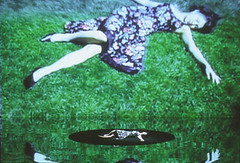
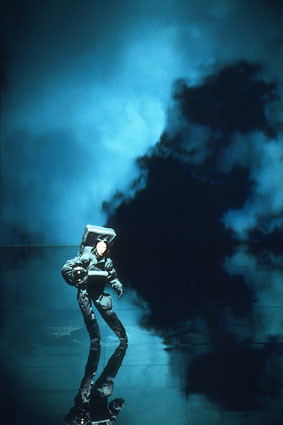
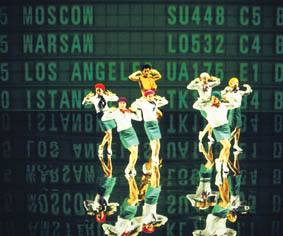
Title:Voyage
Production: Dumb Type
Location: Tramway Glasgow
Dumb Type is a Japanese production company who encourage multi media disciplines. I am mainly aware of them from the involvement of Japanese microtonal composer Ryoji Ikeda. Ikeda having provided the music for Dumb Type's Voyage, which played in Glasgow for 2 nights and saw the company return to the city for the first time in 10 years.
Voyage is a series of scenes, all linking together through the idea of travel, of going on a journey. Two women in a cave, shouting in Japanese as they try to find each other. Subtitles scroll across the screen at the back of the stage, men sweep stones in their path they run in circles. Eventually they are standing side-by-side, comedy arising from it being so dark and cavernous that they can't see each other or tell where the voices are coming from.
A woman cuts a square from a map, puts it into a typewriter, adding new destinations. The stage fills with airhostesses who go through the regimented motions of service, transforming into a grand dance routine. A Japanese woman lies on a circle of grass and tells us in accented English about all her dreams, while the screen shows vast mountain ranges. A passenger runs for a plane, a woman dressed in a grey spacesuit dances through space with voice synching with a man singing Somewhere Over The Rainbow.
Voyage is a mix of humour, absurdity, dance, beauty and passion. Ikeda's sound track ranges from primordial bass, through big dance numbers, to bursts of chaotic noise, all interspersed with examples of his trademark minimalism. The stage is large and goes through all the necessary transformations - from gravel-floored cave to highly reflective outer space. The floor to ceiling screen adds dialogue, images and film - most effective when it seems to extend into the endless floor. The whole sucks us in, becomes hypnotic, fascinating, and we find ourselves grinning with appreciation.
Monday, May 15, 2006
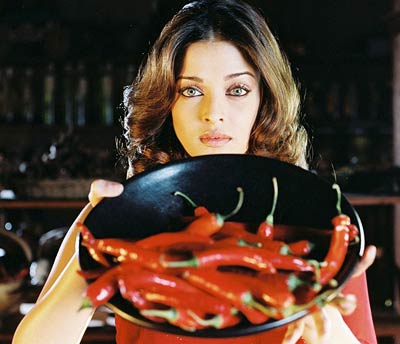
Title:Mistress of Spices
Cast: Aishwarya Rai, Dylan McDermott, Ayesha Dharker, Nitin Chandra Ganatra, Anupam Kher, Padma Lakshmi, Cosima Shaw
Director: Paul Mayeda Berges
As a second daughter in India, Tilo's parents are disappointed, until they realise she has a certain psychic ability. Unfortunately bandits hear about her, and determined that she will make them a fortune they kill her family and kidnap her. She escapes their boats and is washed ashore on an island, where she is met by a woman in white and her disciples - the mistress of spices. Here it is Tilo's destiny to become a mistress of spice herself.
After her training Tilo is sent to San Francisco, carrying a little bit of India with her in the process. At the start of the film text asks the question - what happens to gods when they are taken to other countries, other continents. An idea that was part of why I was interested in seeing Mistress Of Spices, though one that is never really explored. Rather, Tilo is set 3 rules as a spice mistress - she must not touch anyone's flesh, she must never leave her store, and she must never love anyone other than the spice. Of course when you are given rules like that you know that they are going to broken. One by One. And they are. Tilo falling instantly in love with a local man, despite the repeated warning of the spice, which start to turn her power against her, undoing her good, spice enhanced works.
The film Mistress of Spices is based on the novel of the same name by Chitra Banerjee Divakaruni. As a film its a fairly straight forward romantic drama, with undertones that suggest that there might be more to the plot in the book. The film has a Bollywood edge, provided by the presence of Aishwarya Rai, and the narrative progression. Though it is not the kind of film where the cast burst into song, and as such is probably the most subdued film I have seen Aishwarya in. As a whole Mistress of Spices is a safe film, not particularly challenging, though it is actually a reasonably pleasant watch.
Tuesday, May 09, 2006
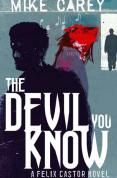
Title:The Devil You Know
Author: Mike Carey
Publisher: Orbit Books
Felix Castor was an exorcist. But when one of his friends became possessed by a demon he did more damage than good, and determined that enough was enough. However having been badgered into doing magic tricks at kid's parties to make some cash he is just in the right place when he gets a phone call about a haunting in a labyrinthine archives just off Euston Station. Even if a series of warnings suggest that taking this job will be the death of him. A woman in white, with her face hidden by a red haze haunts the archive, previously quiet she has suddenly become violent. What should be a simple banishing doesn't turn out that way - Felix had assumed this was an old ghost, rather it seems that this was a young woman who was murdered quite recently.
The Devil You Know is the first novel by Mike Carey, and perhaps its biggest problem is that it isn't his last. I don't mean that in as nasty away as it sounds, what I mean is that from start to finish The Devil You Know feels like a set up for a series of Felix Castor novels. The fact that the front cover says "The Devil You Know: A Felix Castor Novel", while the back shows the cover for the next novel "Vicious Circle", the idea of Castor as a serial is something we are conscious of before we even open the book. Once you have cracked the cover, you get the sense that everything is set up, which of course is the case with most books, but you shouldn't be so conscious of it. Carey builds a cast around Castor so that you can spot the recurring characters by the back story that is crammed in there with them, story that is of no real use to this novel, but justifies the characters ongoing presence. One problem with this is that it isn't even done particularly smoothly - early on we learn that Castor had a sister, there are several references to her, and then suddenly his brother crops up out of nowhere.
The core plot of the ghost in the archive and the associated murder works okay as something to hang a novel around. This means the novel straddles the line between supernatural and crime novel. Of course one problem with crime novels is if the author gives away a vital clue to the readers, but the character fails to pick up on it at all, especially when the character is the narrator and for that information to pass to the reader the character has to observe it. When that happens here the character practically says this is where the girl was murdered, only to take another couple hundred pages for that fact to come to the surface of his mind.
Which of course highlights another problem, as a debut novel The Devil You Know is too long. Just short of 500 pages it starts to feel like something of a slog. Carey's novel is comparable to the likes of Laurel K. Hamilton, who he shares a publisher with, and who is certainly writing in the same ballpark. But at least her first few novels were short, quick, dirty and fun; before she began to tediously overwrite her later work. The Devil You Know wants to be short, sharp and lots of fun, it isn't.
While this is Carey's first novel, he has in fact been writing comics for years. Which opens the question of whether writers moving from one medium to another works or not. There have been a number of novelists in recent times that have moved into comics. Greg Rucka comes to mind as one of the most successful. Richard Morgan who provides the cover blurb being another. Even Denise Mina who took over Hellblazer from Carey. To name a few. Though I can't say I can think of many comic writers who have turned novelists - Neil Gaiman and Alan Moore being the only two published that come to mind. The two are clearly different art forms when it comes to writing, and I suspect that as a comic series Felix Castor would have been more successful. Though even then if we consider this as a first issue of an ongoing series its still a heavy opening shot when what you need is a hook.
Monday, May 08, 2006
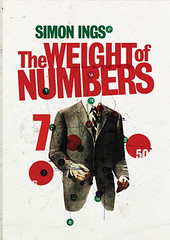
Title:The Weight Of Numbers
Author: Simon Ings
Publisher: Atlantic Books
Two English men meet by chance in Mozambique, retreating from their original plans due to ongoing instability. Later a woman flies to Mozambique, a failing anorectic actress, who is going to make a film about land mines for a charity. Later one of the men sits in a hotel in Glasgow, watching an actress talk about land mines in Mozambique, a strange sensation to see familiar locations. The other man fails to appear, and the British arm of their business collapses. Later the man is in America when he meets a woman, who he recognises from the film about land mines, they start to talk.
From there The Weight Of Numbers pieces together a jigsaw of pieces. Each section 3-5 chapters long. We go back to the start of the second world war, stepping forward chunks at a time, through disparate snapshots of lives. A woman with an ability for synasthestic mathematics, who ends up a waitress instead of a code breaker. Another genius who ends up growing oranges in Palestine, the birth of modern day Israel. Cuban exiles running drugs. The man who changed the face of wrestling in America. A man who abducts a little girl. Or more importantly? The first man on the moon, and how that pushed the assassination of potential leader in Mozambique back in the news.
As we work through these fragments a couple of things happen. The first is that we are constantly on the edge of events, The Weight Of Numbers clinging to the periphery of great events; people who spoke to people great things happened to and the like. The second is the building of links, coincidental encounters that build a web, that build a structure. So that by the end The Weight of Numbers seems to suffocate under the weight of its own irony.
The way that The Weight Of Numbers pieces the plot together reminds to a small degree of Nick Walker's BlackBox, though references to Apollo 11 and 13 have more in common with Walker's follow up HelloLand. Though Ings novel has less of the edge of humour that works its way into Walker's work. More substantially, it could be said that The Weight Of Numbers is Ings's Cryptonomicon, the flash back to the second war building to a present, the cameo by Alan Turing, the periphery of cryptology. The two novels have a lot in common, at least taken on one level, on another they are very different. the title actually having more in common with events in Stephenson's Snow Crash than Cryptonomicon. There is something more eclectic and evasive about The Weight of Numbers, something much harder to pin down, which will no doubt make this a novel that is inaccessible to some.
The Weight of Numbers is the sixth novel by British novelist Simon Ings. Though you would perhaps be forgiven for thinking it was his debut. The novel itself provides no indication that he has previous works published, and his back catalogue is not the easiest thing to come by. Going back his novel The City Of The Iron Fish was a fantasy/science fiction novel, a new weird kind of thing. That was joined by a run of post-Gibson cyberpunk novels Hotwire, Hothead and Headlong, all working loosely in the same environment. His last novel was Painkillers, which was elusive from the start, I don't think I ever saw a book shop stock this transitional novel. A work set in 1999, it was his first novel to come in to a contemporary setting, it felt a little muddled at the time as he was still tying into his previous works. After Painkillers apparent lack of success and a seeming silence from the author, I was starting to get the impression that he had vanished from the publishing scene. This would have been a pity, as I have always rather enjoyed his work, so I was rather pleased to find this new novel unexpectedly. Even more so since The Weight of Numbers actually seems to have had some decent promotion upon publication.
The Weight of Numbers is a little bemusing, the sort of read that you can't easily sum up, and that you need to stick with in order for it to pay off. Despite that, I quite enjoyed it. A novel that is a complete change from his previous work, I have little doubt that writing in The Weight of Numbers is his best to date.
Monday, May 01, 2006
Assorted Links
- Whispered Apologies Webcomic
- Studio Ghibli Trailer - Tales Of Earthsea - Ian McDonald posted this link.
- The Little Goddess - Ian McDonald - his short story is also now online.
- Hanalei Bay Part 1 - Haruki Murakami
- Hanalei Bay Part 2 - Haruki Murakami
- Paul Pope in Publisher's Weekly talking about Batman Year 100
 this is the voice of re:mote induction.
this is the voice of re:mote induction.